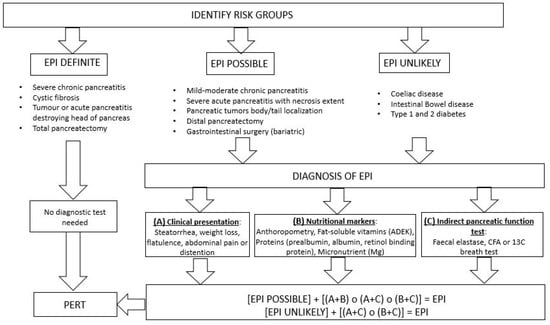Exocrine pancreatic insufficiency (EPI), an important cause of maldigestion and malnutrition, results from primary pancreatic disease or is secondary to impaired exocrine pancreatic function. Although chronic pancreatitis is the most common cause of EPI, several additional causes exist. These include pancreatic tumors, pancreatic resection procedures, and cystic fibrosis. Other diseases and conditions, such as diabetes mellitus, celiac disease, inflammatory bowel disease, and advanced patient...| MDPI
Exocrine pancreatic insufficiency (EPI) is defined as the maldigestion of foods due to inadequate pancreatic secretion, which can be caused by alterations in its stimulation, production, transport, or interaction with nutrients at duodenal level. The most frequent causes are chronic pancreatitis in adults and cystic fibrosis in children. The prevalence of EPI is high, varying according to its etiology, but it is considered to be underdiagnosed and undertreated. Its importance lies in the qual...| MDPI
Background Exocrine pancreatic insufficiency (EPI) is characterized by a deficiency of exocrine pancreatic enzymes, resulting in malabsorption. Numerous conditions account for the etiology of EPI, with the most common being diseases of the pancreatic parenchyma including chronic pancreatitis, cystic fibrosis, and a history of extensive necrotizing acute pancreatitis. Treatment for EPI includes dietary management, lifestyle changes (i.e., decrease in alcohol consumption and smoking cessation),...| BioMed Central



